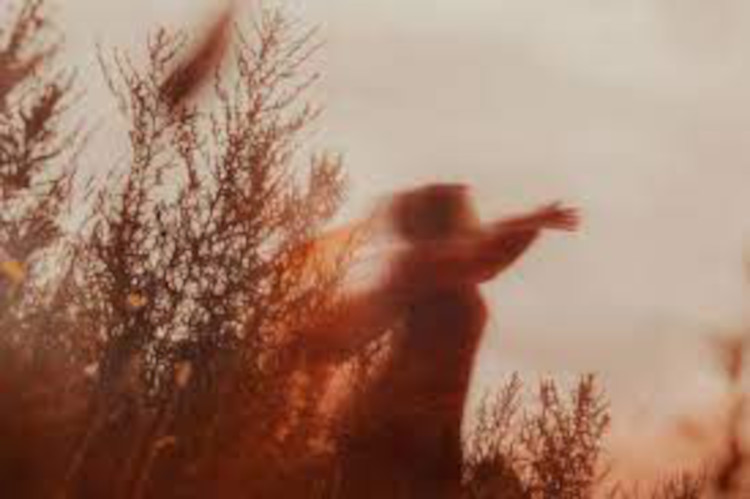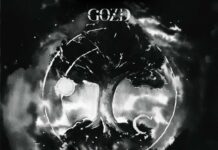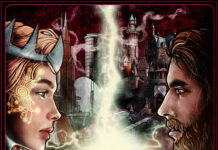The early traditional Finnish music is predominantly folksy and ingrained with a distinct touch of darkness. When you strip away the layers of shanty, polka, mazurka, and whatever cabaret-like ornamentation the music comes with the lyrics alone could easily make the “Murder Ballads” album by NICK CAVE AND THE BAD SEEDS sound like Sesame Street singalongs. Quite often the traditional songs have lifted the lyrics straight from the archaic Finnish folk poetry, which can be summed up with one word: grim. Every now and then though, along comes an artist who, by way of some musical black magic, channels the primordial darkness of those vintage folk numbers in a brand new, striking context so that it can quite literally make your skin crawl – but in a good way. The Tampere-based trio, TUHKA, have dressed these vintage folk ruminations in the guise of dark electronica on their eponymous debut album, released independently on October 22nd, 2021. The marriage of these seemingly disparate musical styles works extraordinarily well, by turns resonating with the aura of dark ambient, trip-hop, and the southern Gothic of Nick Cave and the like. When such an up-and-coming outfit manages to trigger broad-ranging, pleasant flashbacks of artists such as PORTISHEAD, ULVER, Vesa-Matti Loiri, and Paula Vesala, you should know that it is something out of the ordinary.

The album sets its overwhelming, gruesome tone with a song built around the traditional poem, “Kultaansa ikävöivä,” from Kanteletar – the collection of Finnish folk poetry compiled by Elias Lönnrot in the 1840s. The poem has been released as a song under the title “Tuoll’ on mun kultani” almost two hundred times over the years, according to the Finnish music database, Fono.fi, and I have heard quite a few of those. Yet, I have never heard a rendition so thoroughly intense as the reconstruction on this TUHKA outing. The song’s prevalent mood is that of desperate, unrequited love and the vocalist, Annaleena Haapasalo, is pretty damn convincing in her vocal delivery. The raw emotion conveyed by the song is strongly reminiscent of that blood-chilling Paula Vesala performance of the song, “Elegia,” on the Vain Elämää television series in 2014. The gritty twang of the guitars also triggers pleasant flashbacks of Adrian Utley‘s signature sound on all those lovely PORTISHEAD albums.
The following track, “Jos sais kerran reissullansa,” may be familiar to Finns either as the iconic Tapio Rautavaara rendition from way back or as the tongue-in-cheek version by LAPINLAHDEN LINNUT. Here, the jocular and folksy aspects of the song are completely dissolved and traded off for a somewhat dystopian, mid-tempo techno beat. Despite the fact that the lyrics are about the courting of potential partners, the song does not ooze particularly festive vibes. You don’t exactly feel like taking over the dancefloor with your Saturday Night Fever moves in the high hopes of getting lucky tonight.
The next song, “Herrojen kanssa pellon laidassa,” is probably the most chilling track on the outing. It is a hypnotic piano meditation with grim, spoken-word lyrics that are transgressive in the spirit of Hubert Selby Jr. – the American writer renowned for his novel, Requiem for a Dream. The synthetic, dark ambient canvas upon which the unisono motif by piano and guitar wanders about, in a slightly absent-minded fashion, creates nothing short of an unsettling soundtrack for the grim narrative of the lyrics. The occasional wah-wah bursts sound as though having been extorted from the dead souls in Dante’s Inferno.
The next couple of tracks, “Tuonelan koira” and “Hyvää hyvää iltaa,” gear up on the gritty, urban techno aesthetics in a somewhat similar manner to some of those four-to-the-floor techno affairs by Björk but with the Slavic melancholy turned up a notch. Maybe it’s just me but somehow these more uptempo bangers do not go down so well – they utterly lack the thick sense of hopelessness and the desperate undercurrent of the previous tracks. Maybe the songs tiptoe a bit too close to the trendy coffee-table electronica sound of yesteryear. Three songs deep into the album, I would have expected something more unsettling, darker, and closer to the sound of, say, TRENTEMØLLER or even vintage NINE INCH NAILS. Of course, it may just as well have something to do with the fact that I am an incurable sucker for extremely darkly shaded music.
“Se ilta oli pimiä” steers back into the deep, dark waters – and it does it by being a genuinely haunting crescendo of emotion. The song sends shivers down my spine like seeing a ghost. Driven by the pulse of a heartbeat, the song grows from a wistful whisper into a thunder of synths, employing an overarching sense of drama like the stereotypical exit music for a film. Quite befittingly, the track is slightly reminiscent of John Murphy‘s “Adagio in D Minor” from the soundtrack of the film, Sunshine. The song goes to show that you don’t need much to conjure up a genuine ocean of emotions. Here, the trick is done with a pinch of post-rock guitars, droning synths, and a bit of tweaking with the synthesizer filter resonance.
Sandwiched between the aforementioned widescreen electronica adagio and the piano meditation, “Oliko pelkkää unta vaan,” closing the album, the track, “Velisurmaaja,” throws in oriental melodies in the form of a duet between Haapasalo and the band’s studio wizard, Lauri Pulakka. If the lyrical theme wasn’t fratricide, you could mistake the song for a nice chill-out number at a psytrance party. Nonetheless, there is a subtle shamanic vibe to the song. The fractal guitar-riff could easily fit even on, say, the sublime shaman-metal outing, “InitIAtion,” released last year by the metal psychonauts, IA.
This album brings its journey to a close with a beautiful piano-driven hymn that sounds so vast and spacious that it creates an aural illusion of floating through space in zero gravity. The melancholic undercurrent suggests, however, that Major Tom has lost contact with the ground control. The lyrics ruminate whether everything has been just a dream. I cannot avoid thinking about ULVER‘s most magnificent sonic incantations on their 2007 album “Shadows On the Sun.” What a brilliant trip!
TUHKA brings new life to traditional folk poems in nothing short of a breathtaking way and it triggers a flashback of Vesa-Matti Loiri‘s 1998 album “Rurja,” on which the new versions of old traditional songs – re-arranged by the guitar maestro, Peter Lerche – hit a glorious home run. Both albums are thoroughly melancholic, even gruesome on occasion, but once again, confirm the timeless, inescapable truth: don’t we just love when beautiful music tells us terrible things?
Written by Jani Lehtinen
Tracklist
- Tuoll’ on mun kultani
- Jos sais kerran reissullansa
- Herrojen kanssa pellolla
- Tuonelan koira
- Hyvää hyvää iltaa
- Se ilta oli pimiä
- Velisurmaaja
- Oliko pelkkää unta vaan
Lineup
Annaleena Haapasalo – vocals
Lauri Pulakka – programming, synths
Aimo Laitamo – guitars
Label
Independent





